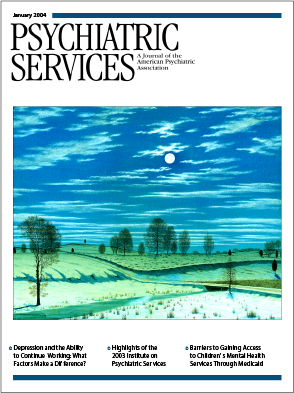Correlates of Health Insurance Among Persons With Schizophrenia in a Statewide Behavioral Health Care System
Abstract
This study explored the demographic and service use correlates of insurance status among 539 persons with schizophrenia-spectrum disorders by using the administrative data set of a statewide behavioral health care system. Lack of health insurance was prevalent in the sample (20 percent) and was associated with younger age, Latino ethnicity, and male sex. Persons who did not have insurance were less likely to use a community-based service and more likely to use only crisis or emergency services than persons who had public or private insurance. The findings are consistent with the results of previous research demonstrating that lack of insurance is associated with decreased use of community-based services among persons with severe mental illness.



